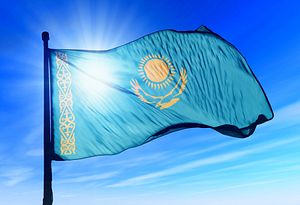On May 21, police in Kazakhstan kept people from protesting in several cities across the country. Security forces detained hundreds of people and more than dozen journalists–many were snatched from sidewalks near public squares, which were closed off by police cordons, chased down sidewalks, loaded onto buses, then released a few hours later.
The May 21 protests had their roots in the late April protests against changes to the Land Code which prompted a rare policy changes in Astana. But while the initial protests were aimed at worries about the sale of Kazakh land to foreigners–particularly the Chinese–they took on greater meaning for those watching the developments. Kazakhstan does not often have large public protests, but in recent months, as dark economic clouds linger, there have been more. For example, in January a march of mortgage holders dressed in grey and black protested in front of a major bank in Almaty. But the bank was the target of their anger, not the state.
That is why Kazakhstan responded to the continued land protests in the way it did. Eurasianet called it an “autocratic turn” and quoted a man on a bench in Astana as remarking: “They detain anybody who says something negative about the government.”
Why is Kazakhstan so spooked? There are many facets to attempting to explain both the protests and the govrnment’s hamfisted response to them. I cannot pretend to offer a comprehensive explanation, but a start is this: the state is wholly unfamiliar (and uncomfortable) with dissent. It has pursued a narrative of national unity that misinterprets dissension on policy points as disloyalty. It is also enamored of the structure of democracy–or perhaps just the international image of having one–but doesn’t understand the messy reality that it entails.
The framework within which Kazakhstan understands the relation between the state and its people does not allow much, if any, space for dissent. This is without a doubt inherited from the Soviet Union, but sustained since because of Kazakhstan’s prosperity–relative to Soviet times as well as to its regional neighbors.
The country has not seen the revolutions that overturned Kyrgyzstan’s post-Soviet order, nor the civil war that scars Tajikistan’s politics to this day. Kazakhstan has never been as closed as Turkmenistan, which approaches North Korea in its eccentricity. And Kazakhstan has, by and large, embraced an international persona, imbuing its relations with the rest of the world with importance, that Uzbekistan seems to have little taste for on the whole.
In the past 25 years, Kazakhstan’s GDP has grown from $24.88 billion in 1991 to $231.9 billion in 2013. Its poverty rate has fallen from 46.7 percent in 2001 to 2.8 in 2014. These are the wins with which the government has argued for–and by and large received–passive acceptance of authoritarian embellishments to its democracy. This version of a social contract has begun, in a way, to unravel as the Kazakh economy stalls. Low oil prices in the past year have put pressure on the state and the devaluation of the tenge brought that pain to Kazakhs of all economic standing. Several corruption scandals have spilled into public view, putting on display the profligacy of Kazakhstan’s elite.
Kazakhstan brands itself a democracy. It highlights this in what defenses it offers for the behaviors of the state–like Foreign Minister Erlan Idrissov’s op-ed regarding the Land Code changes–that its citizens “have the right of protest… provided it is peaceful and organized, as in other countries, in accordance with the law.”
Astana has argued that the protests were illegal because organizers were denied permits. In Kazakhstan, all public gatherings require permits approved by the mayor, and mayors are appointed, not elected. Mayors, owing their jobs to Nazarbayev’s goodwill, are highly unlikely to approve protests against the government. In this way the system is rigged: Kazakhstan can say, on an international stage, that its laws allow for public assemblies, but it can also deny otherwise reasonable requests.
Some activists detained ahead of May 21 were charged for planning an unsanctioned protest. RFE/RL reported that activists Maks Bokaev and Talgat Ayanov were sentenced to 15 days in jail on May 18. “Posts on social-media sites were used as ‘evidence’ against the two men,” the report noted. In Astana, activists Makhambet Abzhan and Maksat Nurypbayev were each given 10 days, with Abzhan’s wife telling Reuters that the charge was “hooliganism.” On May 17, an activist in Oral was detained for three days on charges he was “inciting social discord.” This begs the question: why apply for a permit if it may essentially be an application for a multi-day stay in the local jail?
Where Kazakhstan goes from here is uncertain, though it’s reasonable to expect both more protests and further crackdowns. The government can interrupt Internet access, block websites, jail agitators and journalists, and, in general, make it difficult or dangerous to speak up but some will do so anyway. Meanwhile, the economic hardships underlying public frustration with the government are not going to disappear overnight. That tension is what spooks Astana.
































